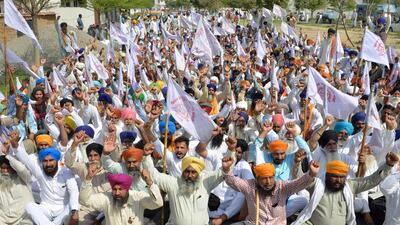India is more like a continent than a country. Its 29 states are enormously diverse, each with their own dazzling array of languages, cultures, communities and religions. Differences in states make regional governors extremely powerful; seven chief ministers govern states with a population of more than 68 million people. Appealing to a diverse electorate of more than 900 million people is remarkably difficult; coming up with policies to suit every sector is even harder. Prime Minister Narendra Modi promised much in 2014 with his new vision for India. He committed to providing a modern, developed economy with jobs for all, efficient and honest government and a fierce national security apparatus – all of it rooted in the traditions of India's Hindu majority. But ahead of fresh elections, which begin today and will last for six weeks, there is some discontent. Although Mr Modi remains personally popular, many who voted for him in 2014 have unmet expectations.
Mr Modi insists economic growth is higher than ever before but for many Indians, both rural and urban, suggestions of a transformation seem far-fetched and remote. Unemployment is rising, particularly among youth. And one group in particular, farmers, have faced increased pressure during Mr Modi's tenure. With his anti-inflation policies lowering incomes and the rising effects of climate change, Indian farmers have many concerns. Smallholder farmers, who represent two-thirds of the Indian electorate, count among their ranks some of the country's poorest and most vulnerable citizens. It is the responsibility of elected leaders to come to their assistance – not with unrealistic promises but with genuine support.
Recent opinion polls put Mr Modi's ruling BJP slightly ahead of the opposition Congress party, run by Rahul Gandhi, grandson of the former prime minister Indira Gandhi and widely viewed as too much of a symbol of the epoch of political dynasties. Meanwhile, the horrific terror attack in disputed Kashmir in February, in which 40 Indian soldiers were killed, allowed Mr Modi to shift the conversation towards national security. After launching airstrikes on terrorists within Pakistan, he authorised an anti-satellite missile test, declaring India had joined the space "super league". This week, in his campaign pledges, he promised to address some of the issues troubling rural workers with a vital $300 billion cash injection, including an annual handout for the 250m poorest farmers. Throughout the run-up to the election, the BJP has leaned heavily on Hindu nationalist rhetoric.
This is shaping up to be a tight election but if Mr Modi secures victory again, Indian voters will be hoping he follows through on his electoral promises. India is the world’s fifth largest economy, growing faster than China last year and with strong ties around the world. Mr Modi has already overseen the construction of vital infrastructure, including roads, housing and metro networks, as well as bringing electricity to millions of homes. Nevertheless, he must act promptly if re-elected to help those most in need, to prevent millions of Indians being left behind.

